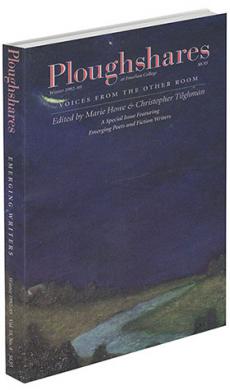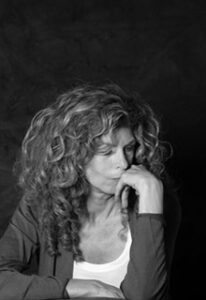rev. of Hurricane Walk by Diann Blakely Shoaf
In her poem "The Homeless in America," which appeared in the
Twentieth Anniversary issue of this magazine, Diann Blakely Shoaf describes a photograph — on exhibit at Parthenon Centennial Park, Nashville — of a mother grooming her son's hair: "How do I even know the child's / alive? — his mother's half-smile / so naked and craving I imagine / she's mad. And dead sons are the norm here — a fake marble Niobe / and a sad kneeling Thetis. . ." That adverb
here opens a trapdoor which sends the reader swinging through millennia; it's the kind of gravity-defying displacement that lifted the top of Emily Dickinson's head. Throughout
Hurricane Walk, her first collection, Diann Blakely Shoaf shows herself capable of providing art's sly double vision, poems offering the equivalent of the word
red printed in green ink.
Shoaf writes about the self's desire to escape — from consciousness, from flesh — into art and nature, into otherness; finally, into death. The sweaty, disheveled speaker in "The Sculpture Garden" is lured by "Marble. . .plaster, icy / and white, / pure inspiration"; she craves the existence of "A saint or a nun, all finished with the flesh." Yet her own passionate rhetoric betrays the impossibility of "an ethereal stare, / seething and breathing / in the hot summer air." In the title poem, the speaker walks into the "whorled force" of hurricane winds: "A more comfortable lust would have kept me / inside." Such is her satiation — "it was better than sex, the way it relaxed me" — that "the slightest goodnight kiss / is out of the question for weeks"; longing for sensation, in Shoaf's world, leads straight to the convent. In "Vintage," the lonely owner of a secondhand shop assumes a lusher life by taking home
"Fortuny, din(ing) in vintage Dior." Although not all of her characters are equally successful — the voice in "Hostess" is not much different from that of the drunk in "A Rural Phenomenon: Lying-in-the-Road Deaths" — Shoaf demonstrates that, in exploring the nature of self, one is not limited to autobiography.
Hurricane Walk is rich in wit, humor, and irony, from the ingenuous opening line of "Planning a Family" ("I love and want babies — my husband could have them") to the subtler, supple metaphors of "Go in Good Health." Shoaf prefers understatement and control, even when describing an attempted rape ("The Attempt") or imagining "Gauguin in Alaska." Her lines lope with an irregular dactylic rhythm without attempting metrical precision; the effect is that of a song hummed under the poet's breath. Always stretching her poems in more than one direction, Diann Blakely Shoaf reveals both ambition and skill in her first collection.


